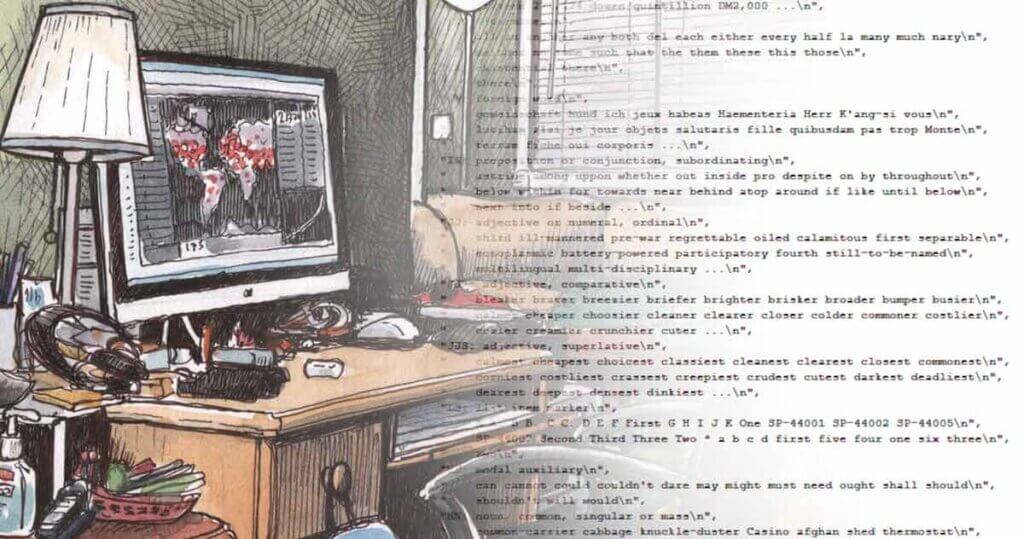
What is digital health humanities?
Digital health humanities is an emerging academic domain that leverages digital methods and tools to analyze health sciences materials for humanistic research. This field is an allied discipline to the digital humanities, using the field’s methods to address problems in health and healthcare. Described as a “big tent,” the digital humanities are unified through their use of digital and computational tools, but not by any specific method. Digital humanists make digital maps, create digital artworks, analyze textual data, collect web scrapings, critique code, and design new digital tools. Projects in the field are often collaborative, take years to complete, and follow an open scholarship publishing model.
Most digital health humanities projects use data in some capacity. This data is used to reassess how human subjects are treated in digital health contexts. Kirsten Ostherr, PhD, MPH argues that the field provides “the integration of situated critique, historical contextualization, and human-centered design” to counter over technologized approaches to health and wellness.
Digital health humanities at UCSF
Digital health humanities research at UCSF uses digital tools to analyze historical and archival materials in medicine, health, and wellness. UCSF Archives and Special Collections has prepared several of its collections for digital health humanities use through its Archives as Data initiative (see below). UCSF has access to other digital information repositories, including HathiTrust, the HathiTrust Research Center, and Calisphere.
The Digital Health Humanities Program, established in 2023, provides research assistance for any research project involving digital methods. This program also onboards scholars who are new to the field so they may learn about unique digital tools and approaches. Interested scholars can learn about or access assistance to the following tools and methods:
- Text analysis, topic modelling, and sentiment analysis (Voyant, AntConc, Mallet)
- GIS mapping (ArcGIS, QGIS)
- Network analysis (Gephi, Net.Create)
- Digital arts-based research
- Digital archive creation (Collection Builder, Mukurtu)
- Digital publishing (Scalar)
Meet our digital health humanities expert

Sean is the digital health humanities program coordinator. He is a digital humanist who works between the history of medicine, media studies, and postcolonial theory. Sean’s work grapples with the ethics around the creation and maintenance of medical collections.
The Advancing Digital Health Humanities Institute
The UCSF Library is hosting a two-year digital health humanities research incubator starting in September, 2024. Funded by the National Endowment of the Humanities’ Institutes for Advanced Topics in the Digital Humanities, this program will onboard health humanists and digital humanists to methods, approaches, and materials for research into health, wellness, and systems of care.
Learn more to about the Advancing Digital Health Humanities Institute.
Archives as Data research guide
“Archives as Data” refers to archival collection materials in digital form that can be shared, accessed, analyzed, and referenced as data. Using digital methods, researchers can work with data repositories to explore and evaluate collection materials and analyze trends and connections within and across them. UCSF Archives and Special Collections provides access to several digitized health sciences collections as data.
In collaboration with subject matter and technical experts, the provides programming and learning resources to encourage and develop researcher capabilities using data science techniques to analyze archival materials and archival datasets.
The Archives as Data research guide is a centralized resource for researchers and contains descriptions of datasets that have been prepared from archival collections, including the following:
Researchers will also find information on accessing and using archives as data, and links to learning resources about various data analysis methods in the research guide.
Online learning resources
The open-source Digital Health Humanities course on the UCSF Collaborative Learning Environment makes resources and recordings from digital health humanities classes and workshops available online. Recordings include digital health humanities overview sessions, approaches to finding and exploring archives as data, and walkthroughs from collaborative workshops with the UCSF Library Data Science and Open Scholarship team.
Additionally, the Data Science Education and Training Portal is an extensive information hub for data science learning resources for the UCSF community.
A digital health humanities reading list is accessible through a public Zotero library. The cited articles in this library introduce new scholars to the health humanities, the digital humanities, and digital approaches to health research. Digital health humanities research examples can be found within the first and second issues of Reviews in Digital Health Humanities’ special issues on race, health and medicine.
The No More Silence initiative is a significant, foundational precursor to digital health humanities programming at UCSF. Outcomes of this initiative include direct computational access to historical data from the San Francisco Bay Area’s response to the HIV/AIDS epidemic, as well as documentation from a series of workshops hosted by Archives and Special Collections. Researchers can access free code and other resources from these workshops for independent exploration.
Contact us
Contact us with any inquiries about digital health humanities programming and resources or to request project consultation.